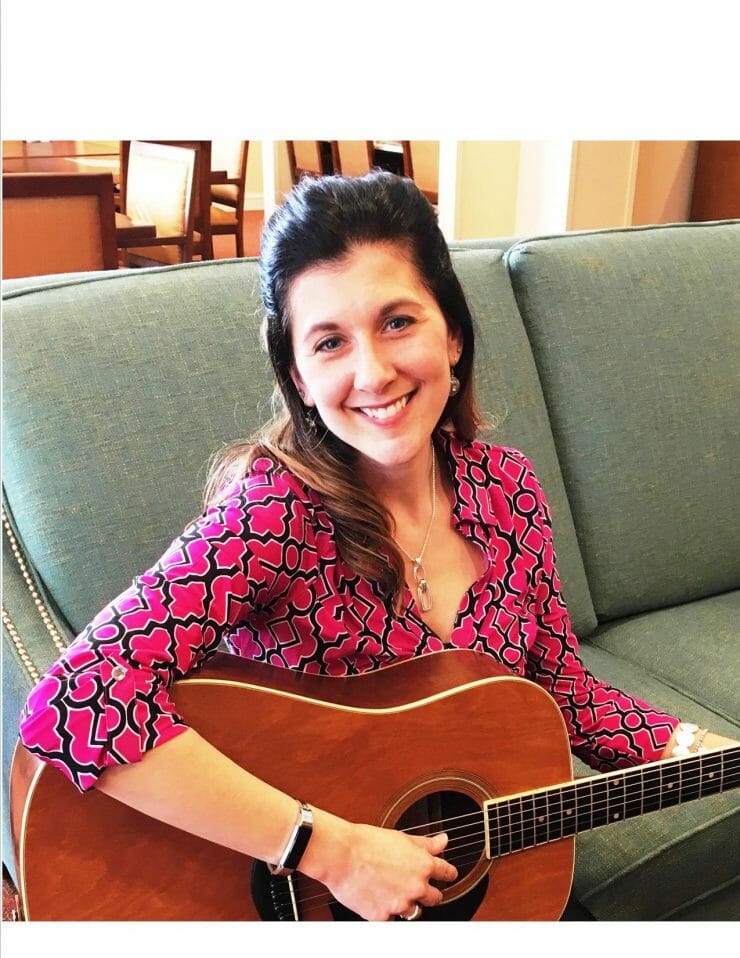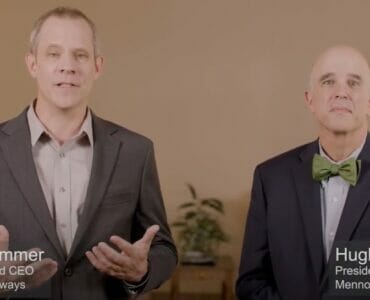Messiah Lifeways at Messiah Village was delighted to launch a music therapy program established in 2018. The program brings a board-certified music therapist to our skilled nursing neighborhoods to offer personalized, clinical service to improve outcomes, behaviors, and holistic wellness for residents. In September 2018, Messiah Lifeways began its contract with WB Music Therapy, LLC based in Harrisburg, PA. Co-owner Kristyn Beeman, MTBC, has begun weekly visits to our skilled nursing neighborhoods as she combines her passion for the healing power of music with her training as a certified dementia practitioner. She recently shared hear thoughts with a little Q & A.
1. What is the difference between music therapy and playing music for fun?
Music can certainly be a pleasurable experience when provided by an entertainer or activity staff member. At first glance, it may be difficult to tell the difference between music therapy and playing music for fun. There are key factors that distinguish music therapists from other providers of music such as entertainers, performers, instrumentalists that evoke relaxation, and even listening to music through headphones on a device.
Board certified music therapists are trained clinicians that have studied the effects of the application of music with a variety of physical and mental health diagnoses. As the brain deteriorates through the process of aging and dementia, music has the power to impact the active parts of the brain, creating opportunities for a person that may otherwise be out-of-reach. Through various musical interventions research indicates an increase in immunoglobulin, a decrease in cortisol, and a release of endorphins which in turn can improve mood while also decreasing pain and agitation. Music therapists are trained to adapt the intervention to the variety of feelings and responses that may arise in sessions. Adaptations may look like introducing music, changing the music, or removing music.
Music is a whole-brain experience. When we listen to, move to, and create music, our brains are activated in many different areas. This is because music is not stored in a localized spot on our brains, but rather is spread around, integrated into the core of our human system. You may have witnessed someone who suffered a stroke not be able to verbalize a four-word sentence, however, they can tunefully sing “you are my sunshine”.
The clinical application of music has the potential to stimulate and improve a person’s cognitive, social, physical, communication, and emotional development. Every person resonates with different styles of music and songs depending on their preferences. Generally speaking, music is not one size fits all. Music and songs from the time period of a person’s formative years, military involvement, love and marriage, career, and major life experiences, are of great importance.
When music is used with intention by a music therapist that is a trained and board-certified professional (MT-BC), the musical experience coupled with the relationship between participants frequently evokes unique and, often, overwhelmingly positive responses.
When a board-certified music therapist observes, assesses, and then designs music experiences to meet the functional abilities, needs, and preferences of a person, positive responses can often be immediate and readily apparent. This positive response occurs in those with and without a musical background. The following list shows a sample of the opportunities one may experience by participating in music therapy:
• Memory recall which contributes to reminiscence and satisfaction with life
• Positive changes in mood and emotional states
• Sense of control over life through successful experiences
• Awareness of self and environment which accompanies increased attention to music
• Anxiety and stress reduction for older adult and caregiver
• Nonpharmacological management of pain and discomfort
• Stimulation which provokes interest even when no other approach is effective
• Structure which promotes rhythmic and continuous movement or vocal fluency as an
adjunct to rehabilitation services
• Emotional intimacy when spouses and families share creative music experiences
• Social interaction with caregivers and families
2. What inspired you to become a music therapist?
I have always had a love for music and a passion for helping people since I was a young girl. When I was in high school, I worked as a feeding assistant in an assisted living facility and fell in love with the residents there. During my first week, some of the seasoned feeding assistants decided to “break me in” by assigning me to residents who they considered difficult to feed. As I entered one woman’s room, they told me she rarely ate anything offered and usually wasn’t very pleasant. I remember walking in and introducing myself only to be met with a scowl and silence. As I prepared her food, I started humming and I remember her looking at me with a confused look on her face. I started softly singing “Amazing Grace” as I offered her spoonfuls of food. She remained quiet but ate all her food with no difficulty. As I was leaving she smiled and said “thank you”. The other feeding assistants were shocked that she had finished a meal. In that moment, I knew I had to pursue a career that incorporated music and helping people and so my research into music therapy began. I was fortunate enough to know my calling at a young age and still feel just as called to be a music therapist today.
3. What is a music therapy session typically like?
Board-certified music therapists around the world work with incredibly diverse populations and in a large variety of settings. A typical session can look very different from one setting to another. Ideally, music therapists are provided pertinent background information on clients and are trained to include participant’s ideas, preferences, and current emotional states within sessions as well as adapt the plans as needed for emotional and physical responses.
Here at Messiah, each session generally starts with a greeting song which is either a familiar song to indicate our time together is beginning or an original song written purposefully to gain attention and participation. This song varies with each group and individual session. As the session continues, depending on the group participants or an individual’s needs, interventions may include:
• Movement to live and/or recorded music to develop range of motion, elevate mood, and increase participation
• Lyric analysis to be a catalyst for discussion and process feelings
• Structured playing with instruments such as drums, tambourines, and shakers to increase motor skills and give opportunities for self-expression, imitation, group cohesion, and tactile stimulation
• Therapeutic singing to improve communication skills including increasing clarity and speed of words and adjusting tone and/or pitch of voice
• Song writing to assist memory recall, process feelings, and provide an opportunity for self-expression
• Music-assisted relaxation to decrease anxiety and agitation. While carefully chosen music is played live or previously recorded, the music therapist verbally guides a client or group through a calming routine.
After gauging emotional responses from group members or individuals and providing validation and support as needed, the group or individuals sing and/or listen to the routine closing song which provides structure and signals the end of the session.
4. Looking back over your career, what is the most impactful moment with a client that you can recall?
A few years ago, I began working with an older woman with dementia who had moved into an assisted living facility a few weeks prior. She was having significant difficulty transitioning into her new environment and was extremely anxious. She paced the hallway, literally shaking with fear asking repeatedly “where am I?” Very seldom did she engage in lucid conversation but instead spoke in broken sentences. During the first few sessions, I initiated music assisted relaxations but she was so anxious she had difficulty attending to the intervention and often would leave the room. After several weeks, I began matching the tempo of her walking to familiar songs and then gradually used songs with slower tempos encouraging her walking and breathing to match. This seemed to work well as evidenced by her slower walking tempo and relaxed facial muscles. On one particular day, she was extremely anxious and crying. I put on the song “Blueberry Hill” which she had responded positively to in a prior session. She immediately stopped pacing, turned to me, threw her arms around me and began dancing with me. I could feel her muscles relaxing as she danced and sang along. As the song ended, she looked me in my eyes and said “I am grateful for you, more than you know”. Hearing her speak in a full sentence while clearly expressing her feelings was an incredible moment I will never forget. I held back tears of joy until I turned around and saw staff crying as they had witnessed this joyful moment as well.
I have had the pleasure of witnessing so many wonderful moments within music therapy sessions. From client’s regaining speech through singing, expressing difficult feelings through song writing, increasing lost motor skills through movement to music to having meaningful interactions through instrument playing, I am continuously humbled each day by the power of music and am grateful to have the opportunity to use it to enhance people’s lives.
5. What are your impressions of Messiah Lifeways so far?
In my 15 years of being a music therapist, I can honestly say I have NEVER been more welcomed into a senior living community as I have been at Messiah Lifeways. All the staff I’ve interacted with are extremely kind, willing to help, and are clearly driven to provide the best quality care to the residents. It is evident that staff abides by and shows Messiah’s Christian mission statement- “to serve older adults with Christ-like love.” The first time I met with the staff to discuss our music therapy program, my face hurt from smiling so much. It was a genuine experience I will forever cherish. I feel grateful to be part of the Messiah Lifeways family and look forward to continuing to provide quality music therapy services.
Composed by: Rachel Pease, Director of Development at Messiah Lifeways





